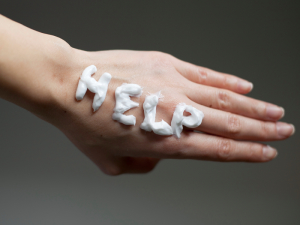 It’s normal to experience dry skin, hair and nails during the winter months. Our bodies lose moisture through our skin and mucus membranes, and the cold, dry air reduces our own oil and sweat production, so we have less natural lubrication and protection on our skin.
It’s normal to experience dry skin, hair and nails during the winter months. Our bodies lose moisture through our skin and mucus membranes, and the cold, dry air reduces our own oil and sweat production, so we have less natural lubrication and protection on our skin.
But when your skin, hair, and nails, even your eyes and mouth, become pathologically dry, it’s time to re-think the reasons. That is not normal seasonal dryness–it could be a sign of slowed metabolism due to problems with your thyroid hormones.
We might normally think of slow metabolism as causing fatigue and obesity. While those are two common symptoms, there are many others. Low thyroid function and slowed metabolism affect virtually every body system, and for some, it appears first as thinning hair, cracked, dry, cold hands and feet, and brittle nails. Even dry, “gummy” eyes and mouth can be associated with slowed metabolism. (However, they are more likely to be a symptom of a related autoimmune problem, Sjogren’s syndrome.) Slow metabolism slows down the rate of cell regeneration. That means that cells with a high turn-over rate–like skin–are first to suffer when metabolism slows.
If your hide is dry, and especially, if you also have cold hands–I suggest you check to see if your body temperature is low. (For complete instructions on how to take your body temperature accurately, see “How are body temperatures measured”.) If it is consistently below 97.8 F (36.56 C) chances are good you have slow metabolism. (If it is consistently low despite having normal thyroid tests, you have a condition called Wilson’s Temperature Syndrome.)
Low metabolism is often caused by low levels of T3, the active form of thyroid hormone. Some people have trouble converting T4 to T3, a problem many doctors simply don’t recognize and that the standard thyroid tests can’t pick up.
People with Wilson’s Temperature Syndrome often have subtle symptoms of low metabolism but are told their thyroid is fine. They feel better–and their body temperature returns to normal–when they take a small dose of T3, the active form of thyroid hormone.
You can discuss taking a course of T3 (active thyroid hormone) with your doctor. Your doctor can call us at 800.420.5801 to get more information about how to use T3 and to discuss your individual case. The object of T3 therapy is to normalize your oral body temperatures to average 98.6 F. (37 C.) during treatment.
Other things that can help your metabolism, dry skin and eyes, and restore normal hormone balance include omega-3 fatty acids such as fish oil and flaxseed, proper nutrition (especially iodine, selenium, iron, zinc, biotin and vitamin C) and taking botanical formulas that support your thyroid and adrenal glands.
REFERENCES
Heymann WR, Gans EH, Manders SM, et al. Xerosis in hypothyroidism: a potential role for the use of topical thyroid hormone in euthyroid patients. Med Hypotheses. 2001 Dec;57(6):736-9.
Jabbour SA. Cutaneous manifestations of endocrine disorders: a guide for dermatologists. Am J Clin Dermatol. 2003;4(5):315-31.

Leave A Comment